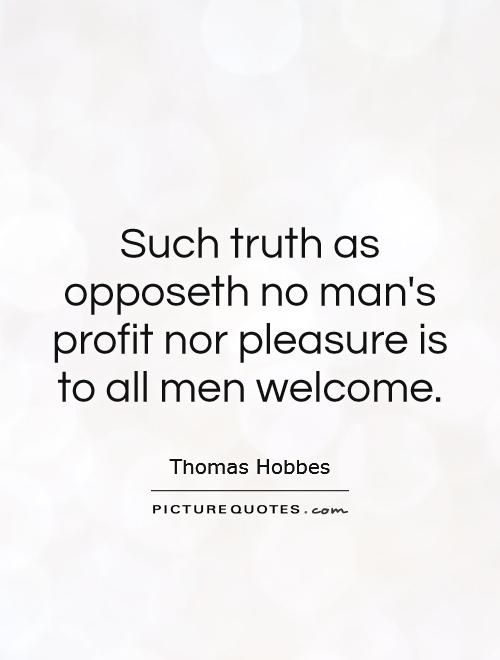Such truth as opposeth no man's profit nor pleasure is to all men welcome

Such truth as opposeth no man's profit nor pleasure is to all men welcome
Thomas Hobbes, a prominent English philosopher of the 17th century, is often associated with his seminal work "Leviathan" in which he expounds his political philosophy. One of the key principles that Hobbes emphasizes in his writings is the idea that truth, when it does not conflict with anyone's interests or pleasures, is universally accepted and welcomed by all. This notion is encapsulated in the famous quote: "Such truth as opposeth no man's profit nor pleasure is to all men welcome."Hobbes believed that human beings are fundamentally driven by self-interest and the pursuit of their own pleasure and profit. In his view, individuals are naturally inclined to seek out information and knowledge that aligns with their own desires and goals. However, when a truth is presented that does not threaten or challenge these interests, people are more likely to accept it and incorporate it into their understanding of the world.
This idea is particularly relevant in the context of Hobbes' political philosophy, which is centered around the concept of the social contract. According to Hobbes, individuals enter into a social contract with one another in order to establish a civil society that can protect them from the state of nature, which he famously described as "solitary, poor, nasty, brutish, and short." In this social contract, individuals agree to give up some of their freedoms in exchange for the protection and security provided by a sovereign authority.












 Friendship Quotes
Friendship Quotes Love Quotes
Love Quotes Life Quotes
Life Quotes Funny Quotes
Funny Quotes Motivational Quotes
Motivational Quotes Inspirational Quotes
Inspirational Quotes